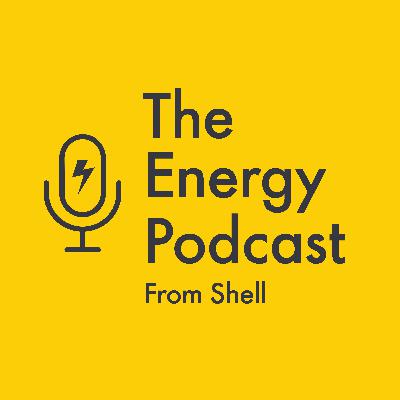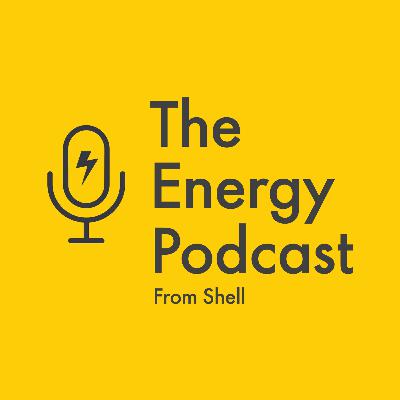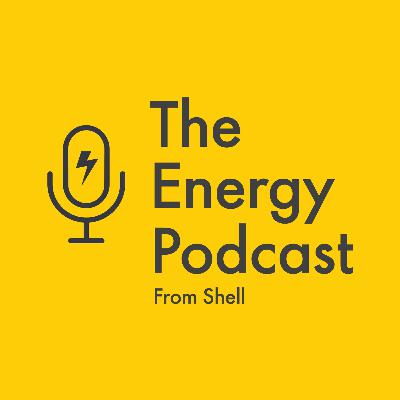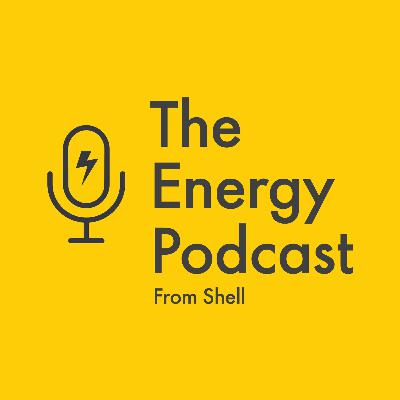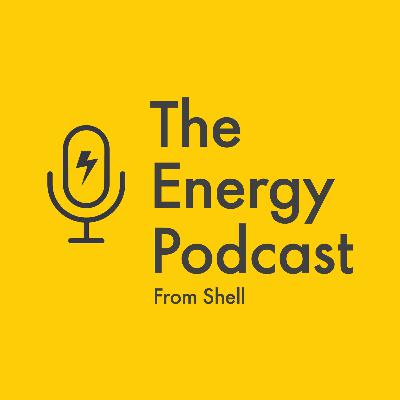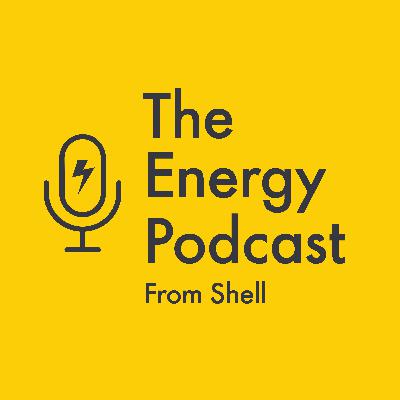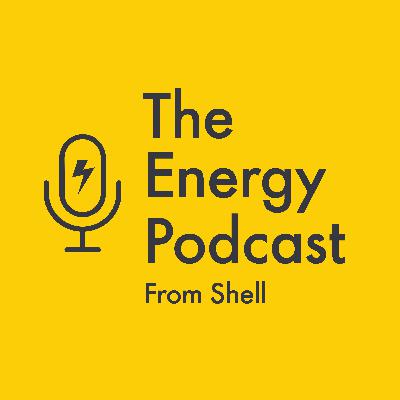Can AI get the world to net zero faster?
Description
Rapid advances in artificial intelligence (AI) are helping the energy industry accelerate the transition to a low-carbon future. The Energy Podcast explores how AI is being used today and discusses how to unleash its potential.
Presented by Eno Alfred-Adeogun. Featuring Kate Kallot, founder and CEO of Amini, Bob Flint, CEO of Mirico and Amy Challen, Shell’s global head of AI.
Additional reporting by Claire François and Berry Mulder.
The Energy Podcast is a Fresh Air Production for Shell, produced by Annie Day and Sarah Moore and edited by Eno Alfred-Adeogun.
Eno Alfred-Adeogun: Today on The Energy Podcast.
Audio: I will be working alongside humans to provide assistance and support and will not be replacing any existing jobs.
You sure about that, Grace?
Yes, I am sure.
Eno Alfred-Adeogun: That’s Nurse Grace speaking at the world's first robot press conference last year. And yes, she’s a robot. Powered by artificial intelligence this humanoid can diagnose illness, deliver treatments, and even offer patients emotional support. Impressive, right? Well, yes, but she’s just one of many examples of AI-enabled machines designed to address some of the world's biggest challenges; social care, disease, hunger, and probably sooner than you think. Consider how deeply AI is already entwined in so much of our daily lives. From work commutes …
Audio: You’ve arrived at your destination.
Eno Alfred-Adeogun: ... to virtual learning …
Audio: (foreign language).
Eno Alfred-Adeogun: ... to, " Alexa, what’s on my to- do list?"
Audio: Subscribe to The Energy Podcast.
Eno Alfred-Adeogun: A global AI revolution isn’t coming, it’s already here. So, could this rapidly advancing technology also tackle the pressing challenge of lowering emissions? Hello, I’m Eno Alfred-Adeogun, and today on The Energy Podcast we ask, can AI get the world to net- zero faster?
Joining me to discuss this is Kate Kallot, founder and CEO of the African tech startup Amini. Bob Flint, CEO of methane emission monitoring company Mirico. And Shell's global head of artificial intelligence, Amy Challen. It’s really great to have you all on the episode today.
Now, before we delve into the world of AI, a really helpful place to begin is defining what it actually is. Because by the number of definitions I found when researching this episode, that's actually harder to do than it sounds. So let’s briefly see if we can reach a consensus of what it actually is. Kate, coming to you first.
Kate Kallot: For me, I have one simple definition of AI, which is going to literally take one sentence. It is the science to make computers think and take actions like humans.
Eno Alfred-Adeogun: Love it. Brilliant. Brilliant. Amy, what about you? Can you add to that?
Amy Challen: I think I’m going to give a more boring answer. I often think about it compared to software. In software, we write the rules. We say, " If this happens, then that happens," and we define what that rule is. But AI works differently. We give AI a load of historical data, and we say, " You tell us what happens based on the patterns you've observed in the past." And so it can be a bit of surprise what it comes up with. The other thing to watch out for is that if our historical data is biased, if the world has changed, then we're going to see that in the model. So we have to be quite careful.
Eno Alfred-Adeogun: Okay. Bob, no pressure. We’ve got two great answers. Do you have anything to add onto the definition?
Bob Flint: Yeah, I get to go last. I think all of the above, plus extending into areas where humans aren't necessarily good, which is looking at huge volumes of data. So being able to process all the bits and bytes that come from sensors from the real world and floods of information like you would find in an oil and gas company and process that in super high speed.
Eno Alfred-Adeogun: Okay, so now that’s clear, we can turn our attention to how the energy sector is actually harnessing the power of AI. So, Bob, your company, Mirico, it monitors emissions, and then companies can pair the data that you gather with AI, which can then help to combat the emissions found. Can you share some good examples of this pairing in action?
Bob Flint: What we do is primarily we address the issue of methane emissions from energy. And methane is about 30 times worse than carbon dioxide for global warming, so it’s something that we all should be concerned about. The good news is if you stop emitting methane, the world starts to cool pretty much immediately because methane just decomposes in the atmosphere. So that’s why it’s so important. So we scan an area, say, an oil and gas facility, for those emissions. Measurement leads to action, leads to reduction, and we can then put that data into one of Shell's systems of record, say a digital twin.
Eno Alfred-Adeogun: On the digital twin, because that's another concept I feel like I've read a lot about as well. Could you just expand on what that is?
Bob Flint: A digital twin would be a replica of something in the real world, a refinery, a rig and it sits in silico, in a computer rather than in the physical world. So that would enable you to, for example, start making predictions or what-if type of questions on what might happen in the real world in circumstances which you wouldn't want to see. So you might predict what happens if I change temperatures and pressures in a way that might be dangerous. Well, I can do that in a computer. I wouldn’t want to do that in the real world.
Eno Alfred-Adeogun: Now, considering the ambitious climate targets that have been set worldwide, it's really no wonder that people are looking to AI for solutions. Amy, what would you say are the main ways that AI is enabling a low-carbon energy system?
Amy Challen: I think there are four main ways it’s already doing this and is going to continue in the future. Firstly, it can improve the efficiency of everything we're already doing. Whether that’s renewables or hydrocarbons, a couple of percentage points of efficiency can make a difference to the productivity of our energy system and can reduce CO2 emissions and methane emissions. The second one is I don't think we're going to enable a widespread renewable system without having really excellent forecasting and optimisation, two things that AI is incredibly good at. Because renewables like wind and solar, they're intermittent. Sometimes the wind blows, sometimes the sun shines, sometimes it doesn't, and it's not entirely predictable. So, you use AI to predict when that will happen and to optimise how you use your battery, how you buy and sell energy to make sure that we always have the energy supply when we need it.
The third way is through everything we can do in lab sciences, in research and development there, and in design of a new energy components and systems. So for example, with the lab sciences, you have a whole process of research you go through. You look at papers and patents to have an idea of what to research on. AI can really speed up your search there and find the right things to be looking at to make suggestions. And finally, it’s got a big role to play in monitoring. If we don’t know what the current situation is in terms of working out where methane emissions is, then we don't have a baseline, and we can't track. And that’s hugely important to be able to know what's effective, what's not, and where are we going.
Eno Alfred-Adeogun: Kate, you’re based in Africa, so it'd be really, really good if you could paint a picture of the role AI is playing on the continent, if at all, in different energy systems.
Kate Kallot: Africa is still the most data- scarce continent. We think about the data scarcity affecting many different places, whether it's having billions of people that are still unconnected, whether it's having data scarcity when it comes to satellite imagery, when it comes to meteorological data. So when we think about the transformative role of AI in Africa a little bit more broadly, there's still step one that needs to be fixed, which is the data scarcity.
Now, when it comes to where AI can be applied, it's important to remind everyone that AI is just a tool, and it's not going to come and transform everything and make everything bett

